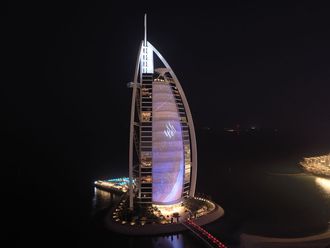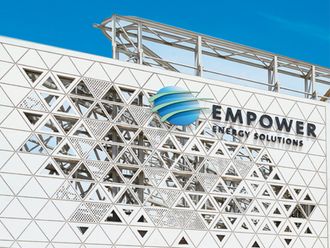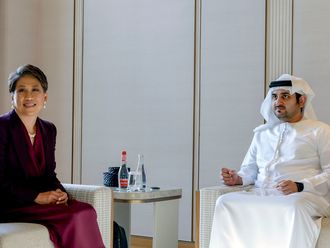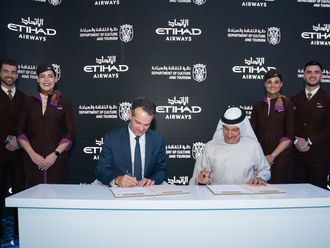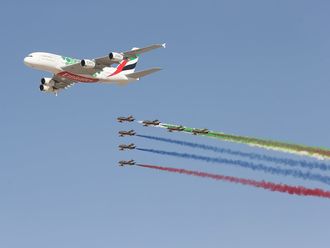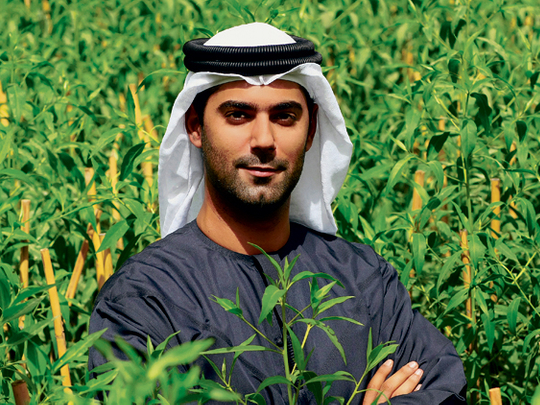
As more villas are handed over in the coming weeks, the promoter of the lushly detailed, unabashedly high-end Al Barari community can look back on a task more than well done.
The element of ‘wilderness', which is what Al Barari stands for in Arabic, has been well captured right across the sprawling development, and at the same time, never impacting upon its livable aspect.
Nowhere is this better captured than in the 34 individually themed botanical gardens set over 14 million square feet. Much of the gardens are in bloom, but a lot of work still needs to be done.
It isn't quite the tent within a game park scenario, but rather a full blown luxury experience. Truly, a haven of green interspersed with streams and ponds.
In such an environment, it could have been difficult to conceptualise and set 287 substantial villas. But, the developer has carried this out with elan. And they can be expected to pull off the same with the coming boutique hotel and spa and penthouse-style apartments. Shopping and leisure desires have, of course, also been taken into account.
Al Barari can be found off Emirates Road heading down from the Al Ain road junction in the Jebel Ali direction. Fittingly, it is surrounded on one side by a private conservation area — gazelles are said to have jumped over the fence to take a peak at the construction site in the early phases, but have since been reined in.
Property caught up with the chief operating officer of Al Barari, Mohammad Bin Zaal, to find out what makes this project tick..
The exuberant greenery and the zen feel are the hallmarks of your development. How did you manage to create this sync with nature?
We're very lucky in that we had the resources and manpower to do this. We had 1,800 species of plants from 20-odd countries. Having our plant nursery Greenworks on site helped a lot.
We initially imported most of the plants and now produce our own. Our 95 per cent success rate on all the plants we brought in is — in nursery terms — unbelievable. On the landscape design, we have our own team from an affiliate, Second Nature and Sustainable Earth, a sister company, which is in landscape construction, doing the implementation.
How did you keep the imported plants not only alive but growing? And what will happen to the nursery once the project is completed?
As soon as we bring the plants in from abroad, we have to acclimatise them at different temperatures in the greenhouses. Then we take them to shaded areas before planting. We even have 2,000-year-old olive trees from Jordan and Spain - prized possessions. We got plants and palms from Malaysia and China, but at the same time, we preserve the local biodiversity and rescue plants from all over Dubai as well. And the plants give back to the development. The temperature is better with the plants around.
Greenworks nursery comprises 1.6 million square feet and will become a commercial entity. Actually we already supply the municipality.
Al Barari seems to have done its bit to create an eco-conscious development. What measures did you actually put in place?
We try to minimise water consumption via intelligent irrigation, reusing water onsite and implement things like solar-powered lighting for the streets. We have a waste management system, which is one of a kind in the region. It is an all-underground waste system.
You throw your waste in separate bins in front of your house and then it gets hydroelectrically transported and is hermetically sealed. So, you get no cats and rats that you usually find rummaging bins left out in the sun.
You applied an energy-efficient design in the layout as well as the architecture. What about the lifestyle aspects to create a sustainable community?
Sustainability in the social sense is an important aspect for us. Everybody looks at it from a carbon footprint point of view but miss out the social aspect of a sustainable development.
We're trying to create community areas where people can gather along the walkways and common areas. For example, we put seating areas all around the gardens in specific locations to encourage people to use them.
In most developments, you just get into your car to drive through the community. Here we're trying to encourage people, by creating lush grounds, to walk around.
I believe you are also going to live in theAl Barari community?
My family started this in the first place because we wanted a place for ourselves to live, where you can know your neighbours and all of those things. You can build a haven inside your villa, but often, the overall community doesn't offer the same. In some of the best places in Dubai, you've got a road in front and behind your house.
So, did you get to choose your neighbours?
We know our clients very well, we were practically a community before the first villas were handed over. I know 80 per cent on a first-name basis, sometimes we go out for dinner and it's nice.
Who has bought into the Al Barari lifestyle?
Businessmen and merchants from the Subcontinent who have been here all their lives, but who could never own homes because of freehold issues. Now, they've got their dream homes.
As well as celebrities from the UK, Africa, Australia, China, Scandinavia and Europe. Of them, 90 per cent are residents and the remaining, mostly from England will use these as summer homes until they retire and then move out here.
What about the apartments and offices?
We would like to have been very specific about who would come. But, times have changed obviously. In general, we would like to encourage all the green companies because it supports our environment.
Even on the office side, we created a lot of gardens with Wi-Fi connection. In Dubai, if you want to go down for lunch, you mostly find steel and concrete, a commercial and cold environment.
We'll have the highest vertical garden in the world at 60 storeys in the middle of one building. We want to create loads of pleasant places where people can go and eat and still be connected to business.
The villas are obviously a secluded area. What concept do the apartments follow?
The whole of the second phase will be open to public, but the residential area remains off-limits. The lifestyle apartments — for lack of a better word — use a lot of features that we already have in the villas. So, a lot of natural skylights and swimming pool in every apartment. You either have a whole or half a floor.
The three-bedroom apartment is about 5,000 square feet with terraces, an open kitchen and herb garden. We try to give people a different style of living even if they're in an apartment.
How does this apply to the feel of the community in general?
There are no roads in the entire Phase Two. We'll have a huge underground network, in most areas. Even when you drive to your apartment you go through a network of tunnels.
They won't be all closed, but will have sunken gardens as you drive by in the tunnel. In every building cluster you have a huge sunken garden in the basement with an opening so you have natural light coming down.
There are two options: you either go straight up to your apartment or you can walk through this garden and up into the main entrance of the building. The intention is to shed a different light and inject life via green walls and plants into all of these usually gloomy areas.
Sounds enticing, what else will residents and visitors find?
The retail spaces have a souq kind of feel, overlooking waterways and gardens. There is of course the boutique hotel with approximately 140 keys and a spa. The grand mosque is positioned on an island and inside there is a huge courtyard, two floors, ground and mezzanine.
The cultural island will also have a dance theatre, library and art galleries. We're very specific about who we let in as well, it has to give young local and regional artists a space to showcase their works.
At present there's only one warehouses in Al Quoz, Dubai. We have to give them suitable areas they can make use of.
Phase Two hasn't physically taken off yet. Considering the current economic conditions does it make sense to launch a bit later?
Exactly. In mid-2010 we will be announcing the programme of the second phase. We're 100 per cent committed to it.
We did a sort of soft offering to some of our clients, 20 units were sold at the time. This was before the financial crisis. During the crisis we've talked to our clients and said let's see how things go.
How have you been financing the project?
We're a zero-debt company, we haven't taken on any financing, so can sleep easily at night. That's one thing off our minds.
Of course we put huge amounts into this project ourselves, but it is paying off. We sold over 70 per cent of the villas before the crisis and collected the majority of the instalments, linked to construction schedule. They were due at different times depending on completion of each villa, we've been lucky with that.
However, our decisions were not commercially driven. For my father it is about leaving something that will be sustainable years down the road, an amazing place in the middle of the desert. For him that was a lot more important than any numbers.
It had to make commercial sense, but it wasn't the driving force behind this development at all.
How did you absorb the market correction?
There has been a correction, but from our original price to now we're still at double of what we sold for. We started selling at about Dh12 million for the smallest and now, going up in size, sell them at Dh20 million, Dh30 million and 45 million. So every single one of my clients, if they sold their villa, made a huge premium.
Have you had any defaults?
Any company has defaults, but we have the same ones than we had before the recession. Some had problems, may be five people out of the 200 plus. We talked to them and tried to help out.
Has there been a significant delay that clients could complain about?
There are always delays in any project. We planned to hand over the houses in August 2008, so we're about a year late and a bit off schedule.
The 230 KW substation was built by us and certified by Dewa. We couldn't wait for anyone else to do it for us, so we got on with it. The sewage treatment and water polishing plant is connected and completely sustainable.
Often it is design changes that cause delays. Did you experience the same problems?
The quality was important and Al Naboodah Construction and Engineering Services was very good in ironing out all imperfections. It took about two years to construct the villas.
There have been a lot of changes, almost 4,000 variations to the original contracts. We do ask our clients what they want. At the end of the day we are creating this community for them not for ourselves, they have to be happy with the product.
Clients wanted to remove walls, move pools to completely different locations and some wanted to change their gardens.
What is next? You still have 30 per cent you haven't sold yet?
Construction of the remaining villas is underway. We still have on average five potential clients a day looking at these villas, more than before the crisis.
Now, of course there is less urgency for people to buy. They usually take a lot of time to make a decision. The smallest villa is 12,000 square feet and all the roof spaces can be used.
Then we have 16 ‘palaces', right at the end of the huge lake. At 27,000 to 43,000 square feet built-up, they are worth Dh100 to 200 million. We will sell and build them on demand.
Are the community facilities ready?
We have an exciting retail village for the villa area, which should be ready when the handover of villas in completed (around mid-2010). It consists of a Gourmet Providores and grocery stores, bookshop, cafes and restaurants, a tailor, jeweller, beauticians, chocolatier, medical centre, supermarket, art gallery, florist and garden centre - all within walking distance of your home.
Looking ahead, would you do another development like this?
Yes, we're looking at Oman and Qatar. We don't want to overstretch ourselves, we'll finish this and then move on to the next.
The location is important, when we drove down to see this plot for the first time we just had the feeling that this was the right area and it has to be the same. There are a lot of places with natural beauty in this region and we want to take advantage of that.
In Saudi Arabia we've been approached many times to do this kind of thing again. We can't replicate it somewhere else — it has to be unique to that location.
Do you feel the market is done with the correction?
When it first happened my family thought this was one of the best things because it was a reality check. It's an international crisis.
Dubai is still the same beautiful safe place to live. Since the beginning of the global economic meltdown up to now I've seen a lot of people leave Dubai and a lot come back as well because they couldn't stand being back in Europe.
People want this lifestyle, we are a gem in this region.
Reality check


